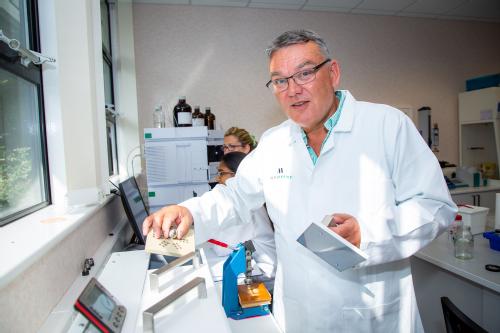Sustainable Plastics - Polymer Chemistry


The way ahead is using polymer chemistry to make more sustainable recyclable plastics

Professor David Haddleton, Department of Chemistry, Warwick

I suppose I became a polymer chemist by accident.
In the late eighties, I did my PhD in organic metallic chemistry; I was working with metals at extremely low temperatures like 10 Kelvin, which is around -263°C. At that point, I thought polymers were plastic bags. A polymer is any of a class of natural or synthetic substances comprising very large molecules. At the time, I had absolutely no interest in them whatsoever.
But I ended up getting a postdoctoral position at the University of Toronto that was funded by Imperial Chemical Industries (ICI) - one of the biggest companies in the world at the time.
That was no coincidence; ICI had noticed that in my PhD in organic metallic chemistry, I’d used ethene as a ligand (a bonding molecule). This happened to be part of the process required to make polyethene (not that I knew it at the time)
So, ICI offered me a job because they wanted my knowledge of polyethene, even though I didn’t realise I had any, and sent me off to learn more about polymers at the University of Southern Mississippi. The biggest challenge of my life as an academic probably came right at the start.
I left industry in the early nineties when we had triplets.
Moving to work at a university offered a far greater work-life balance, but when you’re a dad of three one-year-olds, starting any new job is a big adjustment. I had to juggle things, manage my time effectively and limit the number of conferences I attended to make it work – but I did. I say I left industry, but I still work really closely with businesses big and small through the Polymer Chemistry and Characterisation Research Technology Platform here at Warwick.
Scientists are always trying to solve problems, and often the big solutions come from working in the world beyond academia. The companies we work with, including the likes of Unilever and Lubrizol, come to us with their problems because not only do we have probably the best set of equipment for analysing polymers in Europe, but also because we can help them understand what’s happening with expertise they just don’t have internally. It could be that there is a problem with some packaging, or that they’re keen to make something more sustainable.
Sustainability is the big thing I’m passionate about in my work. Polymers are everywhere. They’re in your mobile phone, your clothes, toiletries in your bathroom…
Yet when people think about plastic, they think about single-use plastics – so the assumption is that we’ve got to remove polymers from our lives. Of course, doing that completely is impossible, so what I think we need to do is to provide materials that perform a lot better and are sustainable, whilst not costing very much more. 
I’m proud to say we’re already doing it, and often in ways most people don’t even notice. It can be as simple as the plastic packaging of food; a few years ago it was black plastic, but now it’s clear plastic because it can be recycled more easily.
Through a spin-out company, I’m also working in transdermal delivery to try to create a hormone replacement patch to give testosterone to women going through the menopause. There’s currently no product in the world that can be prescribed to solve that problem – so if we can make the first, it will be incredibly exciting.
As a working-class lad, I’ve always felt at home at Warwick because it’s a place that gives you a lot of freedom and has never been too traditional. The University can be quite bold, too. I became a Professor after five years, and when anyone suggested a new idea the response was usually “great, go and do it and let’s see what happens”.
In a way, that’s kind of how my career has developed over time, too.
chemistry
